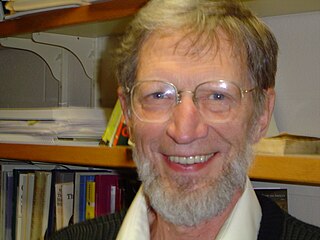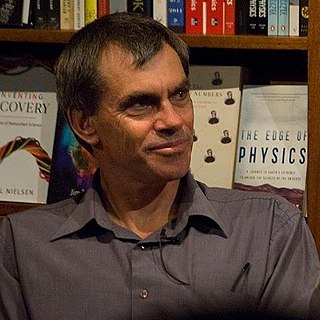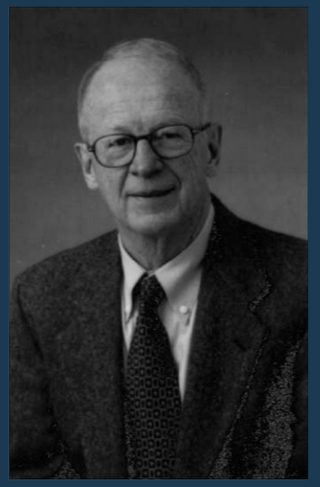Related Research Articles
The problem of evil is the philosophical question of how to reconcile the existence of evil and suffering with an omnipotent, omnibenevolent, and omniscient God. There are currently differing definitions of these concepts. The best known presentation of the problem is attributed to the Greek philosopher Epicurus. It was popularized by David Hume.

In the philosophy of religion, a theodicy is an argument that attempts to resolve the problem of evil that arises when all power and all goodness are simultaneously ascribed to God.
An argument from nonbelief is a philosophical argument for the nonexistence of God that asserts an inconsistency between God's existence and a world that fails to recognize such an entity. It is similar to the classic argument from evil in affirming an inconsistency between the world that exists and the world that would exist if God had certain desires combined with the power to see them through.

Alvin Carl Plantinga is an American analytic philosopher who works primarily in the fields of philosophy of religion, epistemology, and logic.
The existence of God is a subject of debate in the philosophy of religion and theology. A wide variety of arguments for and against the existence of God can be categorized as logical, empirical, metaphysical, subjective, or scientific. In philosophical terms, the question of the existence of God involves the disciplines of epistemology and ontology and the theory of value.
Internet Infidels, Inc. is an American nonprofit educational organization founded in 1995 by Jeffery Jay Lowder and Brett Lemoine. Its mission is to use the Internet to promote a view that supernatural forces or entities do not exist. Internet Infidels maintains a website of educational resources about agnosticism, atheism, freethought, humanism, secularism, and other nontheistic viewpoints particularly relevant to nonbelievers and skeptics of the paranormal. Relevant resources include rebuttals to arguments made by religious apologists and theistic philosophers, transcripts of debates between believers and nonbelievers, and responses from opponents of a naturalistic worldview. The site has been referred to by one of its critics, Christian apologist Gary Habermas, as "one of the Internet's main Web sites for skeptics", and by skeptical physicist Taner Edis as "a major Web site serving nonbelievers". Its tagline is "a drop of reason in a pool of confusion".
Michael Lou Martin was an American philosopher and former professor at Boston University. Martin specialized in the philosophy of religion, although he also worked on the philosophies of science, law, and social science. He served with the US Marine Corps in Korea.

Antony Garrard Newton Flew was an English philosopher. Belonging to the analytic and evidentialist schools of thought, Flew worked on the philosophy of religion. During the course of his career he taught philosophy at the universities of Oxford, Aberdeen, Keele, and Reading in the United Kingdom, and at York University in Toronto, Canada.

Dialogues Concerning Natural Religion is a philosophical work by the Scottish philosopher David Hume, first published in 1779. Through dialogue, three philosophers named Demea, Philo, and Cleanthes debate the nature of God's existence. Whether or not these names reference specific philosophers, ancient or otherwise, remains a topic of scholarly dispute. While all three agree that a god exists, they differ sharply in opinion on God's nature or attributes and how, or if, humankind can come to knowledge of a deity.
Quentin Persifor Smith was an American philosopher. He was professor emeritus of philosophy at Western Michigan University in Kalamazoo, Michigan. He worked in the philosophy of time, philosophy of language, philosophy of physics and philosophy of religion.
Criticism of atheism is criticism of the concepts, validity, or impact of atheism, including associated political and social implications. Criticisms include positions based on the history of science, philosophical and logical criticisms, findings in both the natural and social sciences, theistic apologetic arguments, arguments pertaining to ethics and morality, the effects of atheism on the individual, or the assumptions that underpin atheism.
Classical theism is a theological and philosophical form of theism that conceives of God as the ultimate, transcendent reality, characterized by attributes such as omnipotence, omniscience, and perfect goodness. Rooted in the ancient Greek philosophy of Plato and Aristotle, classical theism presents God as a being who is immutable, impassible, and entirely self-sufficient. This understanding of God emphasizes divine simplicity, where God's essence and existence are identical, making Him fundamentally distinct from all created beings.

Graham Robert Oppy is an Australian philosopher whose main area of research is the philosophy of religion. He is Professor of Philosophy and Associate Dean of Research at Monash University, CEO of the Australasian Association of Philosophy, chief editor of the Australasian Philosophical Review, associate editor of the Australasian Journal of Philosophy, and he is on the editorial boards of Philo, Philosopher's Compass, Religious Studies, and Sophia. He was elected fellow of the Australian Academy of the Humanities in 2009. Oppy is considered by some philosophers to be the most formidable defender of atheism living today.

William Leonard Rowe was a professor of philosophy at Purdue University who specialized in the philosophy of religion. His work played a leading role in the "remarkable revival of analytic philosophy of religion since the 1970s". He was noted for his formulation of the evidential argument from evil.
Nick Trakakis is an Australian philosopher who is Assistant Director of the Centre for Philosophy and Phenomenology of Religion of the Australian Catholic University. He has previously taught at Monash University and Deakin University, and during 2006–2007 he was a postdoctoral research fellow at the Centre for Philosophy of Religion at the University of Notre Dame. He works mainly at the intersections of philosophy, religion, and theology.
The following outline is provided as an overview of and topical guide to atheism:

Alvin Plantinga's free-will defense is a logical argument developed by the American analytic philosopher Alvin Plantinga and published in its final version in his 1977 book God, Freedom, and Evil. Plantinga's argument is a defense against the logical problem of evil as formulated by the philosopher J. L. Mackie beginning in 1955. Mackie's formulation of the logical problem of evil argued that three attributes ascribed to God are logically incompatible with the existence of evil.
Skeptical theism is the view that people should remain skeptical of their ability to discern whether their perceptions about evil can be considered good evidence against the existence of the orthodox Christian God. The central thesis of skeptical theism is that it would not be surprising for an infinitely intelligent and knowledgeable being's reasons for permitting evils to be beyond human comprehension. That is, what may seem like pointless evils may be necessary for a greater good or to prevent equal or even greater evils. This central thesis may be argued from a theistic perspective, but is also argued to defend positions of agnosticism.

The Augustinian theodicy, named for the 4th- and 5th-century theologian and philosopher Augustine of Hippo, is a type of Christian theodicy that developed in response to the evidential problem of evil. As such, it attempts to explain the probability of an omnipotent (all-powerful) and omnibenevolent (all-loving) God amid evidence of evil in the world. A number of variations of this kind of theodicy have been proposed throughout history; their similarities were first described by the 20th-century philosopher John Hick, who classified them as "Augustinian". They typically assert that God is perfectly (ideally) good, that he created the world out of nothing, and that evil is the result of humanity's original sin. The entry of evil into the world is generally explained as consequence of original sin and its continued presence due to humans' misuse of free will and concupiscence. God's goodness and benevolence, according to the Augustinian theodicy, remain perfect and without responsibility for evil or suffering.
Jordan Howard Sobel was a Canadian-American philosopher specializing in ethics, logic, and decision theory. He was a professor of philosophy at the University of Toronto, Canada. In addition to his areas of specialization, Sobel made notable contributions in the fields of philosophy of religion, and value theory. Before his death, Sobel was considered by Christian apologist William Lane Craig to be the leading philosophical defender of Atheism prior to Graham Oppy.
References
- ↑ "Editorial Board (Stanford Encyclopedia of Philosophy)".
- ↑ CV Archived July 27, 2010, at the Wayback Machine , Purdue University site.
- ↑ "Paul Draper, Professor". Philosopher Compass. Blackwell publishing. Archived from the original on April 22, 2007. Retrieved October 10, 2007.
- ↑ Draper, Paul. "Natural Selection and the Problem of Evil". The Great Debate. Internet Infidels. Retrieved October 10, 2007.
- ↑ The Existence of God: William Lane Craig vs Paul Draper U.S. Military Academy at West Point. September 30, 1997.
- ↑ Paul Draper (ed.). "God or Blind Nature? Philosophers Debate the Evidence". Internet Infidels. Retrieved October 10, 2007.
- ↑ Lowder, Jeffrey Jay. "The Biological Role of Pain and Pleasure". Internet infidels. Retrieved October 13, 2007.
- ↑ Draper, Paul (June 1989). "Pain and Pleasure: An Evidential Problem for Theists". Noûs. 23 (3): 331–350. doi:10.2307/2215486. JSTOR 2215486.